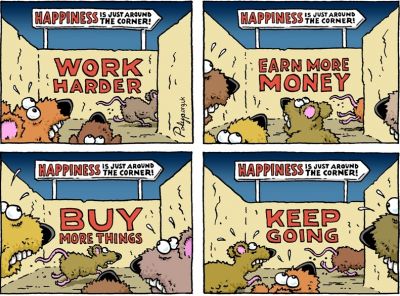Contentment vs. Happiness
Discussion
Eight Common Money Questions Asked by Pastors
Body
“[T]hese are simply the top eight I have been asked most frequently.”
Discussion
When Less Is...Less

If you’re not among the mommy set, you may not have heard about Hattie Garlick, the UK mom who has vowed not to spend a single pound on her two-year-old son for the next year. Hattie’s decision is part social rebellion, part necessity. She credits a growing distaste for “kiddy consumerism” and the fact that she was recently laid off (or as our British cousins say, “made redundant”). Ultimately, her decision is rooted in the ideas of minimalism and thrift—that we don’t need what everybody says we need and what we do need, we can find more cheaply.
I know a bit about this kind of counter-cultural lifestyle. I grew up in a family of seven with an extremely limited income. We gardened, canned, and wore hand-me-downs, not because my parents were making a public statement, but because they were trying to clothe and feed us. Even today with a smaller family and a decidedly larger income, I still buy most of our clothes at Goodwill, we hunt, garden, and can, and my idea of a good time is shopping at Aldi. And yet, even I am skeptical of frugality for frugality’s sake. (If I’m honest, I suppose I’m also a bit of a curmudgeon. Whenever being counter-cultural becomes trendy, I immediately get suspicious—I don’t make a very good hipster.)
Because even while those of us enmeshed in consumerism might need to cut of our hand to save our souls (Matt. 5:30), minimalism can have as many pitfalls as materialism. It’s entirely possible to trade consumerism for a Gnosticism that elevates efficiency and thrift above everything else. Just because we might be counter-cultural doesn’t mean that we don’t have our share of sub-cultural baggage. See if any of this luggage is yours:
Discussion
Is it really so great to win the lottery?
Body
“For these 10 lottery winners, cashing in turned out to have been the worst decision of their lives”
Discussion
Just a Little More
 The Edmonton Oilers traded star left winger, Ryan Smyth, to the New York Islanders in February of 2007. Every sports trade has its multifaceted reasons. This one was about money—yet about so much more.
The Edmonton Oilers traded star left winger, Ryan Smyth, to the New York Islanders in February of 2007. Every sports trade has its multifaceted reasons. This one was about money—yet about so much more.
Ryan Smyth ranked among the National Hockey League’s elite skaters. He was adored by the hockey-crazed Edmonton fans for his work ethic, courageous heart, and fundamental hockey skills. Smyth was also among Edmonton’s most respected citizens. Exemplary in behavior, winsome in demeanor, and revered for his charitable contributions to the community, Ryan Smyth and the Edmonton Oilers seemed to be a match made in hockey heaven.
A native Albertan, Smith had been drafted by the Oilers in 1994—the team he idolized as a child. By 2007, his wife and two daughters were happily settled in Edmonton and the 31-year-old’s career was winding down. In reach was the rare opportunity to finish with the team that drafted him. The Oilers management wanted nothing less for “Captain Canada.” Then new contract negotiations started.
Smyth’s agent, Don Meehan, insisted the Oilers pay their star $27.5 million over 5 years. He reasoned this was a mere $250,000 more per year than the contracts two similarly gifted players, Alex Tanguay (Calgary) and Simon Gagne (Philadelphia) had recently inked with their clubs. Whether to feed Smyth’s ego or to line Meehan’s pockets, making a pittance more per year than Tanguay and Gagne became paramount.



Discussion